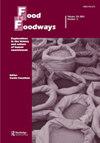农药和家禽的地理分布
IF 1.1
Q2 ANTHROPOLOGY
引用次数: 9
摘要
在这篇文章中,我们关注的是美国南部种植园农业的农业环境维度,通过对人类和非人类生命的相互控制、土地的种族化垄断和饥饿的产生,研究了农业关系对食物方式的制约。通过关注棉花种植农业的化学化和鸡向家禽的转变,我们展示了农业技术如何在时间和空间上扩展了对生命和劳动的种族化控制。在废除奴隶制后的几十年里,白人土地所有者加入了种族化胁迫的法律结构和农业技术,以服务于持续的种植园生产。结合档案和民族志方法,我们追溯了20世纪棉花和家禽生产中的这些动态,我们展示了被认为以农业“生产力”为导向的技术如何通过农业环境种族主义、对土地和劳动力的控制以及饥饿的生产来扩展监狱的监禁动态。我们认为,棉花化学品和家禽工厂的加速,代表了物质和意识形态控制和遏制的种族和空间关系,取代了滋养和解放的生活和联系方式。本文章由计算机程序翻译,如有差异,请以英文原文为准。
Carceral geographies of pesticides and poultry
Abstract In this article, we focus on the agro-environmental dimensions of plantation agriculture in the U.S. South, examining the ways carceral relations constrain foodways through the interrelated control of human and non-human life, the racialized monopolization of land, and the production of hunger. Through a focus on the chemicalization of cotton plantation agriculture and the transformation of chicken to poultry, we show how the racialized control of life and labor has been extended temporally and spatially by means of agricultural technologies. In the decades following the abolition of slavery, white landowners enrolled legal structures of racialized coercion and agricultural technologies in the service of continued plantation production. Combining archival and ethnographic methods, we trace these dynamics in cotton and poultry production in the 20th century, we show how technologies putatively oriented toward agricultural “productivity” extended the carceral dynamics of prisons through agro-environmental racism, the control of land and labor, and the production of hunger. Cotton chemicals and poultry plant speedups, we argue, represent racial and spatial relations of material and ideological control and containment that displace nourishing and liberatory ways of living and relating.
求助全文
通过发布文献求助,成功后即可免费获取论文全文。
去求助
来源期刊

Food and Foodways
ANTHROPOLOGY-
CiteScore
2.20
自引率
0.00%
发文量
16
期刊介绍:
Food and Foodways is a refereed, interdisciplinary, and international journal devoted to publishing original scholarly articles on the history and culture of human nourishment. By reflecting on the role food plays in human relations, this unique journal explores the powerful but often subtle ways in which food has shaped, and shapes, our lives socially, economically, politically, mentally, nutritionally, and morally. Because food is a pervasive social phenomenon, it cannot be approached by any one discipline. We encourage articles that engage dialogue, debate, and exchange across disciplines.
 求助内容:
求助内容: 应助结果提醒方式:
应助结果提醒方式:


